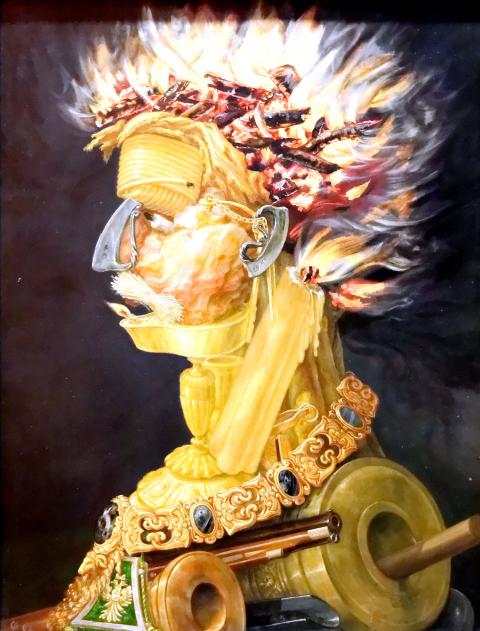Chinese Practice
玩火自焚
(wan2 huo3 zi4 fen2)

Photo: Wikimedia Commons
照片:維基共享資源
play with fire and get burnt
上週的「活用成語」單元提到了英文習語「do not play with fire, or you will get your fingers burned」(不要玩火,不然你會燒傷手指),這是用來警告人別再繼續做某事,因為它可能會引發一連串後果,到最後會反過頭來傷害到自己,就像玩火失了控,起火的人自己最後卻被火舌吞噬。
成語「玩火自焚」──字面意思是玩火卻燒了自己──與英文「do not play with fire, or you will get your fingers burned」的意思若合符節。
這個成語是來自《左傳》。《春秋》是一部史書,記錄春秋時代(西元前七二二~前四八一年)魯國的歷史。《春秋》的文字非常簡略,《左傳》則是對《春秋》的註解──是將《春秋》原來簡略的記載加以擴充說明,在所記載事件發生後多年寫成。《春秋》和《左傳》皆為中國古代經典。
讓我們來看看《春秋左傳.隱公四年》〔西元前七一九年〕中的幾句:
「戊申,衛州吁弒其君完。
夏,公及宋公遇于清。
宋公陳侯蔡人衛人伐鄭。
秋,翬帥師會宋公陳侯蔡人衛人伐鄭。
九月,衛人殺州吁于濮。」
這段文字所說的是,衛國公子州吁(音「須」)謀殺了同父異母之兄衛桓公,以篡奪王位,但結果數個月後,州吁自己也被殺了。
《左傳》對此事評註說,州吁在衛國的篡位,並未獲得大臣或百姓的支持,因此他決定對外國發動戰爭,以藉此提高自己的威望、獲得人民支持。他選擇攻打鄭國,因為鄭國和衛國有宿怨。約在同一時間,宋國的領導層發生了變化──出於事先的協議,宋王把他的兒子公子馮送到鄭國,雖然公子馮較受宋國大臣及百姓愛戴,但宋王只得另立繼位者。繼位的宋殤公便擔心鄭國會幫助公子馮重返宋國、奪回王位。
州吁和宋殤公於是密謀聯軍,並聯合陳國與蔡國的軍隊,一起來攻打鄭國。
聯軍起初對鄭國屢攻不下,魯隱公聽說後便詢問大夫眾仲,依他之見,州吁的計謀是否會成功。眾仲回答說,他只聽過統治者以仁慈和美德贏得人心,但從未聽說可用殘忍和暴力來贏得人心的。眾仲譴責這場殘酷的戰爭,並藉此提出建言,說州吁的所作所為只會讓他的朋友和家人疏遠,並迫使人民起來反對他。眾仲總結道:「夫兵,猶火也,弗戢,將自焚也」(用兵就像玩火:若你不知節制,你就會引火上身,燒死自己)。
雖然州吁最後打敗了鄭國,但他在國內仍不受百姓愛戴,結果被殺了。事情果然不出眾仲所料:州吁最終被自己所放的火所吞噬。
英文「do not play with fire, or you will get your fingers burned」和中文「玩火自焚」這兩個成語,其起源年代相差了數千年、來自完全不同的文化,卻都使用了相同的比喻,以火的不可預測性和力量,來表達相同的意思。
(台北時報林俐凱譯)
這些政客為了選票而煽動分裂,反而造成社會更大的動盪,根本是玩火自焚。
(These politicians have been stoking divisions to attract votes, but ended up causing even greater social unrest. They’ve been playing with fire.)
不要以為你只是逢場作戲,小心你玩火自焚,不但無法全身而退,還賠了夫人又折兵。
(You think you’re just having fun, but you could end up getting your fingers burned. You might not find it that easy to extricate yourself, and you might end up losing your marriage. That will cost you.)
英文練習
do not play with fire,
or you will get your fingers burned
Last week’s Using Idioms mentioned the saying “do not play with fire, or you will get your fingers burned,” used as a warning not to proceed in one’s current course of action, as it may set off a course of events that will come back to hurt you, like a fire going out of control and ultimately engulfing the person who started it.
In Chinese, the idiom 玩火自焚 — literally, play with fire and get burnt — is a good match.
This idiom comes from the zuo zhuan (Commentary of Zuo), a series of commentaries — written years after the recorded events — expanding on the tersely worded annals of the state of Lu, the chunqiu (Spring and Autumn Annals), covering the Spring and Autumn period (722 to 481 BC). Both the zuozhuan and the chunqiu are included among the ancient Chinese classics.
Consider this extract from the Fourth Year of Duke Yin entry of the chunqiu, on the events of 719BC, commented on in the zuo zhuan:
“In the year of Wushen, Zhou Xu of Wei murdered his ruler, Huan.
In summer, the duke met with the duke of Song at Qing.
The duke of Song, the marquis of Chen, an army of Cai and an army of Wei invaded Zheng.
In autumn, Hui led a force, and joined the duke of Song, the marquis of Chen, the army of Cai, and the army of Wei, in the invasion of Zheng.
In the ninth month, the people of Wei put Zhou Xu to death in Pu.”
That is, Zhou Xu usurped the state rulership by murdering his half-brother, Duke Huan, but was himself put to death a matter of months later.
According to the commentary, Zhou Xu’s usurpation of power in Wei wasn’t well-received by either his ministers or his people, and he determined to wage war with another state to win himself some credibility and to get the people behind him. He chose Zheng, a state with which Wei had a troubled relationship. At roughly the same time, a change in leadership had occurred in the state of Song. Although the ministers and people had preferred the ruler’s son, Prince Feng, a prior agreement had obligated the ruler to name a different successor, and Prince Feng was sent to the state of Zheng. Duke Shang of Song was concerned Zheng wanted to help the prince return to Song and claim power.
Zhou Xu and the duke of Song conspired to combine their forces, together with the armies of the states of Chen and Cai, and attack Zheng.
After their initial attempt failed, Duke Yin of Lu asked a senior official, Zhong Zhong, whether Zhou Xu would succeed. Zhong Zhong replied that he had heard of rulers winning their people over through kindness and virtue, but never through ruthlessness and violence. By prosecuting this cruel war, the official advised, Zhou Xu would only alienate himself from his friends and family and cause the people to rise against him. Zhong Zhong concluded by saying 夫兵,猶火也,弗戢,將自焚也: armies are like fire: if you don’t keep events under control, you will burn.
In the end, Zheng was defeated, but Zhou Xu remained unpopular at home, and was eventually put to death. Zhong Zhong had been right in his prediction: the Duke was eventually engulfed in flames of his own making.
Both the English and Chinese idioms, whose origins are separated by millennia and come from entirely different cultures, use the same metaphor, citing the unpredictable nature and power of fire, to refer to the same idea.
(Paul Cooper, Taipei Times)
You know smoking is bad for your health. You’re playing with fire, in more ways than one.
(抽菸有害健康,在不同意義上來說,你都是玩火自焚。)
Playing the stock market can be lucrative, but sometimes it can be like playing with fire.
(玩股票可以賺錢,但有時候會像是玩火自焚。)

A: The 2025 World Masters Games will begin on May 17 and run until May 30. B: World Masters Games? A: It’s a quadrennial multi-sport event for people over 30, which will be jointly held by Taipei and New Taipei City. B: Cool, maybe we can go cheer for all the athletes from home and abroad. A: There will be an athletes’ parade in downtown Taipei prior to the opening ceremony on Saturday. Let’s go then. A: 2025雙北世界壯年運動會5月17日開幕,持續至5月30日閉幕。 B: 世壯運? A: 這是四年一度、以30歲以上青壯年為主的運動會,本屆是由台北市和新北市共同舉辦。 B: 好酷喔,我們去幫來自國內外的選手們加油吧! A: 週六在台北市區會有選手遊行,之後是開幕典禮,我們去看吧。 (By Eddy Chang, Taipei Times/台北時報張迪)

A: Where will the 35 sports of the 2025 World Masters Games be held? B: Apart from Taipei and New Taipei City, some games will take place in Yilan County, Taoyuan County, and Hsinchu County and City. A: The news says about 25,000 people, including many celebrities and sports stars, have already registered for the games. B: Even Taipei Mayor Chiang Wan-an, who is 47, registered for softball and squash. New Taipei Mayor Hou You-yi, who is 68, also registered for table tennis. A: And it will be the largest sports event ever in Taiwan’s history. How exciting. A:

Have you ever wondered who decides what we see in a museum or how one artwork seamlessly connects to the next? Behind every thoughtfully arranged gallery space stands a curator, a skilled professional who combines art and storytelling to craft meaningful experiences. The term “curator” originates from the Latin word cura, meaning “to care.” Curators were originally caretakers of museum collections, but over time, their role has grown to include a broad range of responsibilities that extend far beyond preservation. Today, curators manage, organize and interpret collections in cultural institutions like museums and libraries. They research, acquire and catalogue

Dog owners often wish they could understand their pets’ thoughts. “Dog buttons” might turn their dream into a reality. These specially designed buttons, __1__ sound chips, enable dogs to communicate their needs by pressing buttons corresponding to pre-recorded words like “walk,” “play,” “outside,” and “food.” This bridges the communication __2__ between humans and their canine companions. The science behind dog buttons is based on the concept of associative learning. It’s a process __3__ learners can link actions with outcomes. For instance, if an owner consistently presses the “walk” button and then takes their dog for a walk, the dog